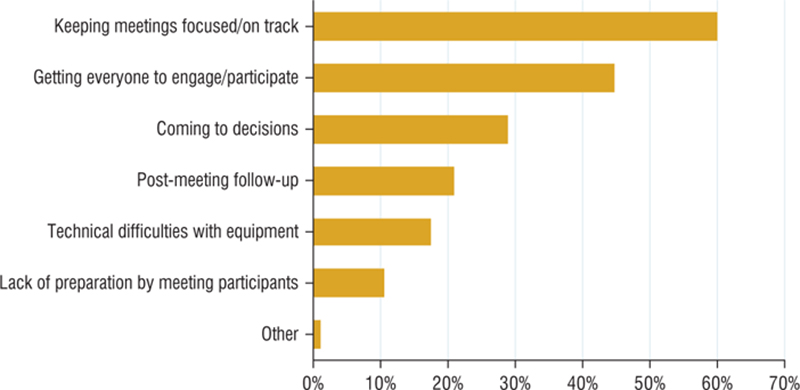Meetings are an indispensable part of any corporate environment. But for some individuals, they are just a waste of time, having to listen to their superiors talk about things that they already know, a pointless undertaking that translates to lost productivity. Now this may be true for some but the outcome of any meeting can vary depending on how you use or misuse them.
Despite this flawed view of meetings, they offer organizations a wide array of benefits. Effective staff meetings are a prerequisite to any company’s success. They pave the way for the development of cutting edge products and services and help executives arrive at sound decisions, which contribute to a company’s growth. Without meetings, businesses would be in a disarray, resulting in slow growth or even dissolution.
Although meetings have a not so favorable reputation as a productivity tool, they still dominate the business landscape. In the United States alone, around 11 million corporate meetings are held daily. A majority of professionals attend an average of 61.8 meetings every month. However, over 50 percent of the time spent on such meetings have been found to be unproductive, resulting in the loss of productive hours, amounting to around four work days.
This gloomy situation has been found to have its roots in professionals’ lack of commitment to making meetings better. Reasons for such behavior include lack of experience with effective meetings, being used to current practices, lack of meeting information and lack of time, among others. There are also problems that hamper the success of a meeting, ranging from inadequate preparation to technical problems that pop up along the way. However, it’s really not too late to rectify these mistakes. There are a plethora of ways by which meetings can work for your business that when implemented properly, can help you reap all the benefits that effective staff meetings entail.

What Are The Benefits of Meetings?
There are more to meetings than being able to come up with a blockbuster product or making a sound corporate decision. They can impact not only companies but those who keep them running as well. However, it can only be done by following a set of successful meetings guidelines. Done correctly, meeting techniques can offer you some of the less pronounced benefits of meetings which include the following:
- Building supportive relationships – Meetings provide team members with a venue where they can aid and support one another.
- Knowing more about colleagues – We can learn more about our co-workers during meetings. Non-verbal communication has been found to convey 55% of communication and the only way this can be accomplished is during face-to-face encounters.
- Provision of workers with a safe environment – A textbook example of such an environment is when Chatham House Rules are employed during a meeting. This enables each participant to share information that should not be handed out through email or reports.
- Provision of a level playing field and an open forum – During meetings, every participant gets his/her share of the communication process. One can speak out and listen without worrying about what others would think.
- Influences leadership – Leaders use meetings to rally team members, make objectives and individuals’ part in it known. Meetings are likewise an ideal venue to engage subordinates.
- Promotes intimacy with colleagues – Meetings promote closeness, security and intimacy among participants specifically during hard times. This is really true as no amount of technology–video conferencing or conference calls–can ever replace personal interactions.
- Provides opportunity for feedback – During meetings, team members can exchange constructive feedback. However, such events should never be used to provide negative feedback as these should be done on a one-on-one basis.
- A learning opportunity – An integral part of any organization, meetings present an opportunity to learn how the company operates, what’s one role in the team, how to effectively manage a team and how to improve the it. Meeting participants can achieve this through efficient note taking.
- Removes the ‘I’ from team – Meetings serve as a constant reminder that one is part of a team.
So now that we know what we can get from meetings, it’s time for us to learn how we can make them generate such benefits. In this article, we take a look at some effective meeting tips, which can not only spice up the way your organization handles meetings, but also make them more enjoyable and productive for all participants.
1. Set a clear objective for the meeting
This is the stage where you define what the meeting is all about. Is it meant to come up with new ideas, information or make crucial decisions? You may or may not require the aid of other employees in accomplishing this. Keep in mind that the foundation of every successful meeting is having a clear agenda and goal. One has to be certain what needs to be accomplished in order to ensure the success of a meeting. This will serve as basis for the focus, agenda and participants of the meeting.
2. Set the meeting outside
Meeting fatigue is real. You can see it when tiredness, lack of energy and fresh ideas start to appear among employees. These are signs that indicate the need for fresh air, what better way to do this than scheduling your meeting outside. This has been proven to prevent meeting fatigue.
Now what places can you take your team to? Outside venues need not be expensive, a cafe, a park or even a bar would suffice. The change in environment is a sure fire way of conducting a productive meeting as it restores energy and great ideas among participants. You would also want to check if the team enjoyed the meeting. If not, you can always try an alternate venue.
3. Preparation is key
A team leader should never be without a prepared agenda during a meeting. All members should be provided with an agenda before the meeting begins. Whats should the agenda include? You can try the following:
- List of topics
- Description of the meeting’s goals
- List of participants
- Names of speakers
- Time and place of the meeting
- Provide attendees with a brief background of the topic
4. The less people the better
Reducing the number of attendees even by just by two can have a significant impact on your overall operation. This is not to say that meetings are for but a select few, it just means that why make someone attend a meeting when a simple email detailing the meeting’s minutes will do? A one-hour meeting could translate to an hour of lost productivity. Let us remember that decision-making is the primary goal of meetings. Those who feel that they are not essential to the topics being discussed may view a meeting as a complete waste of time.
5. Be punctual
Aside from the fact that no one likes anyone who comes in late for a meeting, latecomers can take up to 10 minutes of a meeting, or worse make them longer than anticipated. Besides, it’s unfair to those who come in early. So what do you do about these people? It’s pretty simple, you start and finish the meeting on time. This ought to send a message that being late cannot and will not be tolerated. Another technique is to set meetings at odd times. This has been found to have a positive effect on employees.
6. Make your meetings as short as possible
Meeting participants’ attention span and interest could only last so long. This is due to energy loss from processing too much information. Longer meetings mean more energy loss, hampering productivity. It is strongly advised to keep meetings just under an hour.
7. Stay focused
Veering away from the topic at hand during meetings is highly discouraged. Although storytelling can be of great help, overdoing it could adversely impact meeting length and cause some participants to lose interest. For this reason, it is advised that someone should guide the meeting in accordance to the topics at hand.
It’s not only storytelling that could prove to be bad for your meeting. There is also the potential loss of focus from talking about something that is in fact in the agenda. Changes in the scope of the topic could result from too much discussion of a particular subject.
8. Do not multitask
Modern technology has enabled us to multitask, a good thing really. However, it shouldn’t be done during meetings. Activities such as reading email, text messaging and Internet browsing could get in the way of a meeting’s productivity. In fact, a Harvard Business Review report has shown that multitasking is responsible for a 40% drop in productivity and a 10% IQ loss. To avoid this complication, all meeting participants should be assigned to a particular task, leaving little room for personal activities.
9. Encourage creativity
Believe it or not successful meetings are characterized by creativity and energy. This can be achieved when everybody participates in the ongoings, with discussion and brainstorming encouraged. However, what really results in creativity is following up on the results of such activities.
10. Do follow-ups
Following up on employees after the meeting is just as important as planning one. Remember, individuals have different views of what transpired during a meeting. It would be wise to document all the assignments handed out and their corresponding deadlines if any. This would ensure uniformity of participants’ understanding of what took place. Publishing minutes of the meeting can also help in this matter.
11. Boost your Q and A
Q and A sessions are a common practice during meetings but they are often held at the end of the affair and are given but a couple of minutes. This defeats the purpose of Q and A sessions as a tool for engaging employees and idea generation. This is why such sessions should be just as long as the meeting. Organizers can use pre-written questions to facilitate better discussion between managers and employers.
These are but some of the things that you can do to improve the outcomes of your meetings. These effective meetings habits can do wonders for your company by helping you engage your team members, boost productivity and save on costs. Keep in mind that these meeting techniquess do not only help enrich your organization, they also drive your people to grow.
























To be honest, I find most meetings to be pointless. I noticed that a lot of companies tend to hold weekly meetings, and will still do so even when there is nothing to go over or give reports. This is a complete waste of time.
I think one of the most important things a team can do is to use project management softwares or productivity tools to keep track what progress is made and which tasks are done or needs reviewing before deciding to hold a meeting. We use this free software called Quire to do this. It changed our meetings a lot, and hour long meetings are now reduced to half an hour efficient meetings.
Leave a comment!